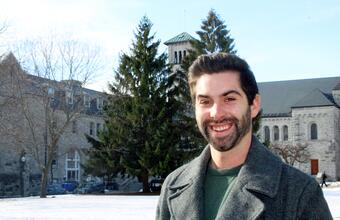
It probably comes as no surprise that cancer rates are rising in Canada, but the causes of cancer are shifting. While we typically associate smoking with cancer, obesity is becoming a leading cause of cancer in Canada among those under the age of 50. Researchers like Dylan O’Sullivan are taking a closer look at the data to better determine how we can prevent these cases.
“In the years ahead, I want to focus my research on the precision prevention of cancer looking at the types of people who would benefit from earlier screening and which lifestyle behaviours increase risks,” he says. “People that engage in one activity that increases cancer tend to engage in other poor behaviours. Instead of interventions that target one behaviour, the focus should be on interventions that target multiple behaviours at once.”
Dylan started with his masters of epidemiology at Queen’s before transitioning to the PhD program. He is currently in his fourth year. As he prepares to transition to his post-doctoral position in Calgary, Mr. O’Sullivan just published his 18th paper and recently wrapped up his involvement in the pan-Canadian ComPARe project.
“ComPARe looks at how many instances of cancer are caused by different modifiable exposures such as ultraviolet radiation through sun exposure and tanning bed, as well as radon and air pollution, and how many could be caused in the future,” he says. “Another part of my thesis is looking at how sun exposure may reduce or increase your risk of non-cutaneous cancers such as lung, blood, breast, and colorectal.”
Dylan’s research has captured significant attention nationally. In particular, his PhD project attained $75,000 in funding from the Canadian Institute for Health Information for his work exploring the role of sun exposure in causing cancer among Canadians.
Dylan has a bit of a different perspective on Kingston as he is from the city originally. He keeps active with several sports teams; pond hockey is keeping him busy during the winter weather.
“In grad school you can get isolated a bit, but I am lucky to have a lot of friends and connections locally,” he says. “I have been helping my fellow graduate students integrate and had the opportunity to supervise four master’s students.”
To learn more about the Epidemiology program, visit the School of Graduate Studies and Postdoctoral Affairs website.